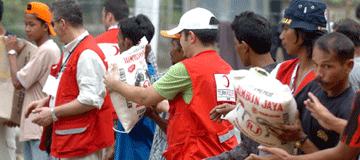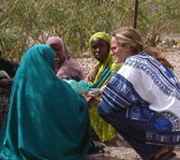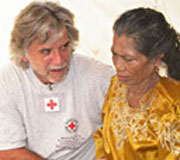Mental and Social Care
To enhance the psychosocial well-being of people affected by disaster certain standards should be followed in managing the aftermath of a disaster or a refugee camp. These standards are thoroughly described by the Sphereproject.
General means of stabilizing the social situation in the camp and of providing psychological and psychiatric care are to be differentiated by Sphereproject.
 Social Stabilization
Social Stabilization
Information
Insecurity and lack of knowledge about the aftermath of a disaster or displacement enhances public anxiety and social tensions. To support social stability, the population should be well-informed about the nature and scale of the disaster and about which relief activities are implemented where and by whom. Risk communication needs to be clear, uncomplicated (understandable to a 12-year-old).
Burials
In order to enable the affected to digest and comprehend losses, mass burials should be avoided as they violate social-cultural norms.
It is important for the protection of individual and public mental stability, to conduct funerals individually and culturally appropriately. Contrary to public beliefs, dead bodies don’t impose an enormous health risk, except when having passed because of an infectious disease, so the time taken for an appropriate burial is acceptable.
 Continuity and Community
Continuity and Community
As much continuity of normal life as possible is supportive to recovery. Displaced populations should be accommodated so that families and communities are kept together. A tracing service can be established to reunite people. Isolated persons like orphans, child combatants, widows and others without families should be integrated into social networks, e.g. by access to activities. Cultural traditions and ceremonies, including religious acts, should be maintained. Youth should have access to schooling and recreational activities. The lay-out of a refugee camp should contain spaces for recreational, cultural and social activities.
Participation
People have a stronger feeling of being able to manage their situation if they have the opportunity to actively engage and participate in concrete common interest activities, such as supporting relief or planning and maintaining facilities.

 Psychological and psychiatric intervention factors
Psychological and psychiatric intervention factors
Psychological First Aid
Psychological first aid is a part of first aid stationed in health facilities for persons who have been exposed to traumatic experiences in the event of a disaster, including both victims and relief staff. It consists of basic, non-intrusive pragmatic care with a focus on listening, but not forcing to talk, assessing and meeting basic needs, encouragement and protection from further harm. This work can be taught quickly to volunteers and professionals. Widespread prescription of psychopharmaca should be avoided for the risk of developing a dependence.
Urgent Psychiatric Needs
Care for urgent psychiatric needs, which means psychiatric conditions that might imply danger to self and others, severe depression and mania, should be available through the primary heath care system. Essential psychiatric medication needs to be on the fundamental drug list. Individuals with preexisting psychiatric disorders continue to receive treatment and medication, as sudden discontinuation may be harmful.
Continuation
In the long-term, a more distinctive system of psychiatric health care should be installed which could also integrate traditional coping mechanisms, such as, cooperation with community leaders and indigenous healers. Self-help groups should be encouraged.



